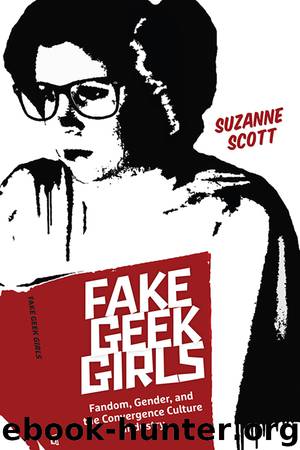Fake Geek Girls by Suzanne Scott

Author:Suzanne Scott
Language: eng
Format: epub
Publisher: NYU Press
Figure 5.1. An example of fan responses to Heroes of Cosplay’s gendered depictions of male fans as uncredited laborers. Anonymous, Heroes of Cosplay Confessions, Tumblr Post, 2014, http://heroesofcosplayconfessions.tumblr.com/post/61472986292.
In spite of the fact that the monetizing of fans’ transformative “labors of love” might be considered a feminist act, the logic persists that “predominantly female [fan] spaces embrace gift cultures while men are more likely to turn their fannish endeavors into for-profit projects.”19 This brings us to a key point, namely, that when contemplating the gendered politics of professionalization within fan culture, we must delineate between the desire and the capacity to professionalize. Whether or not the presumption that male fans desire to professionalize their fan labor while female-dominated communities tend to actively eschew professionalization is accurate is somewhat beside the point. To my mind, it is more important to consider which fans are or are not able to wield fannish affect as a professional asset within the convergence culture industry. As the rest of this chapter will reveal, the capacity to leverage one’s own fan identity for professional gain overwhelmingly favors men.
Liminal Fan/Producer Identities
If the prior section contemplated the gender politics of fans going pro, this section considers the inverse, examining what happens when media professionals strategically embrace and perform their identities as fans. Since its inception, fan studies has fixated on the power dynamics between fans and “The Powers That Be” or TPTB (an industrial category that alternately references studio and network executives, creators and showrunners, and cast or above-the-line crew),20 often characterizing the relationship as “charged with mutual suspicion, if not open conflict.”21 The convergence culture industry’s growing incentive to cultivate fan/producer engagement across digital and social media platforms has complicated, but in no way eradicated, these suspicions and conflicts.22 Authorial engagements with fans in the digital age have more often than not nostalgically attempted to codify, rather than collapse, analog power dynamics between producers and consumers. From early efforts by television showrunners to censor fan discussions on Internet message boards23 to authorial podcasts that reify the romantic figure of the author-god even as they strike a fannish, dialogic tone,24 TPTB continue to “imagine participation as something they can start and stop, channel and reroute, commodify and market.”25
These moments of producorial intervention or fan interaction are typically framed as examples of media creators “breaking the fourth wall.” The contextual origins of the “fourth wall,” which in classical theatrical terms represents the invisible or unacknowledged barrier that separates the fiction from the audience, are newly resonant given the growing promotional imperative to foster participatory culture. We tend to associate the “fourth wall” with the proscenium arch in theater, or the screen in various media contexts, but when the term was coined by French art critic Denis Diderot in the eighteenth century, it was common practice for some audience members to sit on the stage. The close physical proximity made this “fourth wall” a necessary construct, and to break it risked the reality of the fictional world being compromised and ultimately falling apart.
Download
This site does not store any files on its server. We only index and link to content provided by other sites. Please contact the content providers to delete copyright contents if any and email us, we'll remove relevant links or contents immediately.
The Rules Do Not Apply by Ariel Levy(4970)
On the Front Line with the Women Who Fight Back by Stacey Dooley(4873)
The Lonely City by Olivia Laing(4802)
Bluets by Maggie Nelson(4559)
The Confidence Code by Katty Kay(4264)
Three Women by Lisa Taddeo(3434)
Not a Diet Book by James Smith(3429)
Inferior by Angela Saini(3316)
Confessions of a Video Vixen by Karrine Steffans(3311)
A Woman Makes a Plan by Maye Musk(3255)
Pledged by Alexandra Robbins(3179)
Wild Words from Wild Women by Stephens Autumn(3154)
Nice Girls Don't Get the Corner Office by Lois P. Frankel(3048)
Brave by Rose McGowan(2826)
Women & Power by Mary Beard(2769)
Why I Am Not a Feminist by Jessa Crispin(2761)
The Girl in the Spider's Web: A Lisbeth Salander novel, continuing Stieg Larsson's Millennium Series by Lagercrantz David(2724)
The Clitoral Truth: The Secret World at Your Fingertips by Rebecca Chalker(2720)
I Who Have Never Known Men by Jacqueline Harpman(2672)
